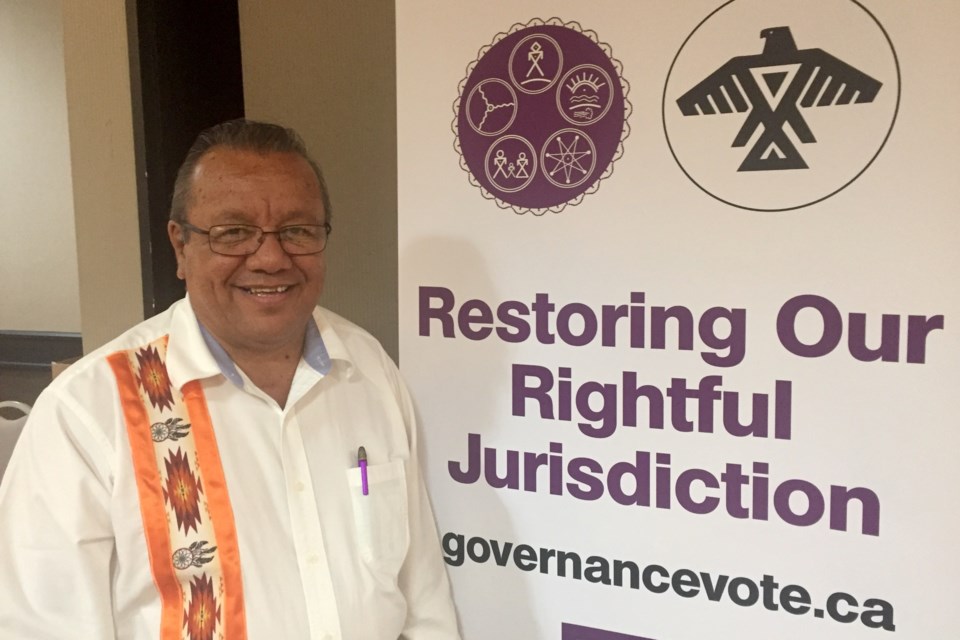Early Tuesday, Glen Hare, grand council chief of the 60,000-member Anishinabek Nation, picked up a newspaper (an ancient storytelling device) at the Quattro Hotel and Conference Centre on Great Northern Road.
"I go straight to my horoscope," the grand chief told a gathering of chuckling getzidijig (elders) and eshekenijig (youth) from across the province.
"Today's is very fitting," Hare said. "It says: Handle joint ventures with care. If a deal sounds too good to be true, start looking for hidden details or false information."
The getzidijig and the eshekenijig have travelled here this week to learn about a proposed governance agreement with the Canadian government.
Culminating almost a quarter-century of negotiations, the deal would formally recognize First Nations for the first time as governments and legal entities able to pass their own laws governing citizenship, elections, culture, language and fiscal administration.
If ratified, the governance agreement will remove Anishinabek First Nations from major portions of the widely despised Indian Act.
It will open the door to talks about other agreements about issues like land, justice and health.
And, it will significantly increase federal funding provided for governance-related functions, culture and language development, and the costs of implementing the new deal.
Ratification voting on the Anishinabek Nation Governance Agreement starts on Thursday and continues until the end of November.
Grand Council Chief Hare quite likes it.
But speaking to the youth and elders governance gathering at the Quattro, he coudn't quite shake the warning sounded in Tuesday's Sagittarian horoscope.
"The package, everything in front of us, is perfect," Hare says. "I stand behind it a thousand per cent, for the future of our communities."
"There's nothing false about it. But maybe to put your own mind at ease, you need to read it again, because when we're all done, it's you that's going to vote on this paper."
If approved by the youth, elders and other members, the agreement would bring big changes to the Anishinabek Nation, which serves as political advocate for 40 Ontario First Nations with roots going back centuries to the Three Fires Confederacy at Michilimackinac.
Funding figures were not provided during the portion of Tuesday's meeting that was open to news media, but the size of the proposed increase emerged later in the day in an official Anishinabek Nation tweet.
“What we’ve been able to negotiate is a substantial increase in funding – a seven-fold increase,” Jidé Afolabi, fiscal relations support advisor, was quoted as saying during the closed session.
An information package distributed at the gathering stressed that the increased cash is largely for work already being done in First Nations.
"Funding agreements will contain substantially more money for governance-related functions," the package said.
"The funding agreements will be for longer terms, five years with renewals. The additional money can be used to offset costs related to elections, government operations, citizenship laws and community engagement."
Currently, "There is not enough funding provided by Canada for government-related activities like holding our council meetings, committee meetings and running elections. Canada provides no funding to promote language and culture," the package stated.
In his speech on Tuesday, Grand Council Chief Hare accused Sudbury of recently refusing evacuees from wildfires in northwestern Ontario.
"I was very heartbroken when I heard that Sudbury said no to evacuees. Everybody else accepted us, though... but Sudbury said no. I was in Kettle Point since then and there was a number of people there, noted officials, and I said I just hope that Sudbury doesn't ask for help tomorrow. I know what I would say. We're supposed to help each other. Ontario is Ontario because a big chunk of the province is us. They wouldn't be here if not for us."
Hare also expressed concern about what's happening to young wildfire evacuees who have found their way to other Ontario cities.
"Kids are being apprehended," he said. "That is so sad. Now look at what they have to deal with the rest of their lives. They're numbered now. That's not what evacuation means to me. That has to change. We're good people."
The Anishinabek Nation Eshekenijig and Getzidijig Governance Gathering continues at the Quattro over the next two days.
